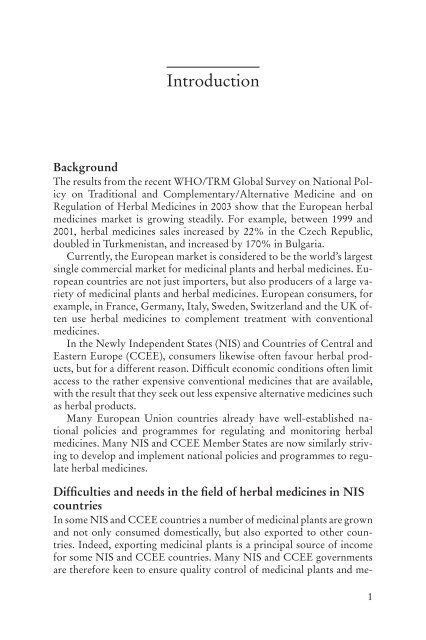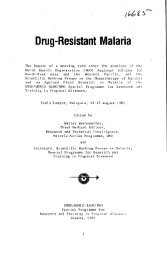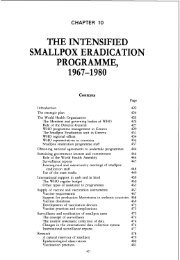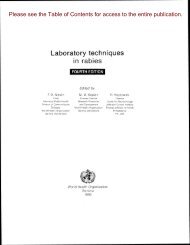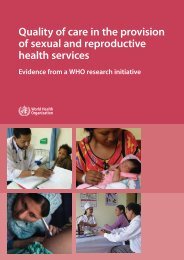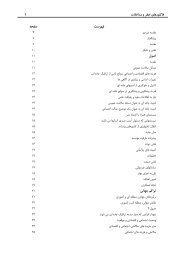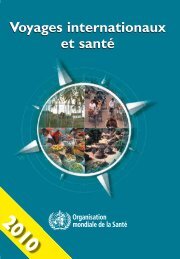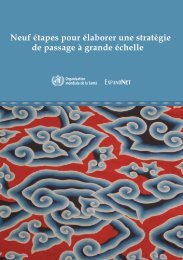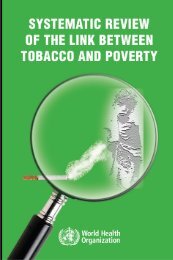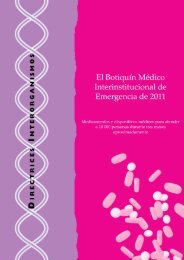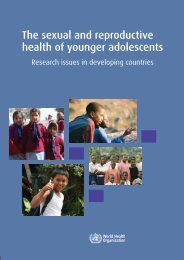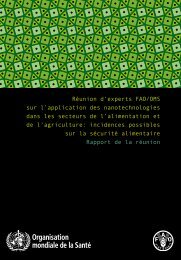- Page 1: WHO monographs on medicinal plants
- Page 4 and 5: WHO Library Cataloguing-in-Publicat
- Page 6 and 7: Contents Herba Thymi 383 Flos Tilia
- Page 10 and 11: Introduction dicinal plant material
- Page 12 and 13: Introduction • adoption of existi
- Page 14 and 15: General technical notices ity assur
- Page 17 and 18: Bulbus Allii Sativi * Definition Bu
- Page 19 and 20: Bulbus Allii Sativi Geographical di
- Page 21 and 22: Bulbus Allii Sativi alliin, allicin
- Page 23 and 24: Bulbus Allii Sativi injection of a
- Page 25 and 26: Bulbus Allii Sativi linaemia (107).
- Page 27 and 28: Bulbus Allii Sativi lary erythrocyt
- Page 29 and 30: Bulbus Allii Sativi References 1. A
- Page 31 and 32: Bulbus Allii Sativi 38. Abbruzzese
- Page 33 and 34: Bulbus Allii Sativi 73. Foushee DB,
- Page 35 and 36: Bulbus Allii Sativi 108. Mathew PT,
- Page 37 and 38: Radix Althaeae * Definition Radix A
- Page 39 and 40: Radix Althaeae Foreign organic matt
- Page 41 and 42: Radix Althaeae Weak inhibition (17%
- Page 43: Radix Althaeae 15. Blaschek W, Fran
- Page 46 and 47: WHO monographs on medicinal plants
- Page 48 and 49: WHO monographs on medicinal plants
- Page 50 and 51: WHO monographs on medicinal plants
- Page 52 and 53: WHO monographs on medicinal plants
- Page 54 and 55: WHO monographs on medicinal plants
- Page 57 and 58: Flos Calendulae * Definition Flos C
- Page 59 and 60:
Flos Calendulae prismatic and very
- Page 61 and 62:
Flos Calendulae β-D -galactopyrano
- Page 63 and 64:
Flos Calendulae flowers (2 ml) inhi
- Page 65 and 66:
Flos Calendulae References 1. Europ
- Page 67:
Flos Calendulae 38. Mascolo N et al
- Page 70 and 71:
WHO monographs on medicinal plants
- Page 72 and 73:
WHO monographs on medicinal plants
- Page 74 and 75:
WHO monographs on medicinal plants
- Page 76 and 77:
WHO monographs on medicinal plants
- Page 78 and 79:
WHO monographs on medicinal plants
- Page 81 and 82:
Herba Chelidonii Definition Herba C
- Page 83 and 84:
Herba Chelidonii Microscopic charac
- Page 85 and 86:
Herba Chelidonii Pesticide residues
- Page 87 and 88:
Herba Chelidonii Intragastric admin
- Page 89 and 90:
Herba Chelidonii rats were divided
- Page 91 and 92:
Herba Chelidonii A placebo-controll
- Page 93 and 94:
Herba Chelidonii Posology (Unless o
- Page 95 and 96:
Herba Chelidonii 45. Guidelines for
- Page 97:
Herba Chelidonii 79. Etxenagusia MA
- Page 100 and 101:
WHO monographs on medicinal plants
- Page 102 and 103:
WHO monographs on medicinal plants
- Page 104 and 105:
WHO monographs on medicinal plants
- Page 106 and 107:
WHO monographs on medicinal plants
- Page 108 and 109:
WHO monographs on medicinal plants
- Page 110 and 111:
WHO monographs on medicinal plants
- Page 112 and 113:
WHO monographs on medicinal plants
- Page 114 and 115:
WHO monographs on medicinal plants
- Page 116 and 117:
WHO monographs on medicinal plants
- Page 118 and 119:
WHO monographs on medicinal plants
- Page 121 and 122:
Herba Equiseti Definition Herba Equ
- Page 123 and 124:
Herba Equiseti nate) scales, formin
- Page 125 and 126:
Herba Equiseti 0.5% mineral matter
- Page 127 and 128:
Herba Equiseti 74%, at the 200 and
- Page 129 and 130:
Herba Equiseti Clinical pharmacolog
- Page 131 and 132:
Herba Equiseti 5. Bisset NG, Wichtl
- Page 133 and 134:
Herba Equiseti 51. Blumenthal M, Go
- Page 135 and 136:
Fructus Foeniculi * Definition Fruc
- Page 137 and 138:
Fructus Foeniculi crorosette crysta
- Page 139 and 140:
Fructus Foeniculi respiratory and u
- Page 141 and 142:
Fructus Foeniculi 250.0 mg/kg bw of
- Page 143 and 144:
Fructus Foeniculi sential oil from
- Page 145 and 146:
Fructus Foeniculi 14. Farnsworth NR
- Page 147 and 148:
Fructus Foeniculi 47. Mills S, Bone
- Page 149 and 150:
Radix Ginseng * Definition Radix Gi
- Page 151 and 152:
Radix Ginseng Geographical distribu
- Page 153 and 154:
Radix Ginseng R1 R2 g i n se n o s
- Page 155 and 156:
Radix Ginseng in the body’s own d
- Page 157 and 158:
Radix Ginseng in rat (76), and rabb
- Page 159 and 160:
Radix Ginseng Antidiabetic activity
- Page 161 and 162:
Radix Ginseng Estrogenic-like side-
- Page 163 and 164:
Radix Ginseng 28. Forgo I. Effect o
- Page 165 and 166:
Radix Ginseng 62. Petkov V. Effect
- Page 167:
Radix Ginseng 95. Tyler V. Performa
- Page 170 and 171:
WHO monographs on medicinal plants
- Page 172 and 173:
WHO monographs on medicinal plants
- Page 174 and 175:
WHO monographs on medicinal plants
- Page 176 and 177:
WHO monographs on medicinal plants
- Page 178 and 179:
WHO monographs on medicinal plants
- Page 180 and 181:
WHO monographs on medicinal plants
- Page 183 and 184:
Flos Helichrysi arenarii Definition
- Page 185 and 186:
Flos Helichrysi arenarii General id
- Page 187 and 188:
Flos Helichrysi arenarii isosalipur
- Page 189 and 190:
Flos Helichrysi arenarii nosa at a
- Page 191 and 192:
Flos Helichrysi arenarii Paediatric
- Page 193:
Flos Helichrysi arenarii 32. Amirdo
- Page 196 and 197:
WHO monographs on medicinal plants
- Page 198 and 199:
WHO monographs on medicinal plants
- Page 200 and 201:
WHO monographs on medicinal plants
- Page 202 and 203:
WHO monographs on medicinal plants
- Page 204 and 205:
WHO monographs on medicinal plants
- Page 206 and 207:
WHO monographs on medicinal plants
- Page 208 and 209:
WHO monographs on medicinal plants
- Page 210 and 211:
WHO monographs on medicinal plants
- Page 212 and 213:
WHO monographs on medicinal plants
- Page 214 and 215:
WHO monographs on medicinal plants
- Page 216 and 217:
WHO monographs on medicinal plants
- Page 218 and 219:
WHO monographs on medicinal plants
- Page 220 and 221:
WHO monographs on medicinal plants
- Page 222 and 223:
WHO monographs on medicinal plants
- Page 224 and 225:
WHO monographs on medicinal plants
- Page 226 and 227:
WHO monographs on medicinal plants
- Page 228 and 229:
WHO monographs on medicinal plants
- Page 230 and 231:
WHO monographs on medicinal plants
- Page 232 and 233:
WHO monographs on medicinal plants
- Page 234 and 235:
WHO monographs on medicinal plants
- Page 237 and 238:
Herba Leonuri Definition Herba Leon
- Page 239 and 240:
Herba Leonuri ing trichomes, uniser
- Page 241 and 242:
Herba Leonuri Other purity tests Co
- Page 243 and 244:
Herba Leonuri demonstrated that in
- Page 245 and 246:
Herba Leonuri uri is also contraind
- Page 247 and 248:
Herba Leonuri 23. Gubanov IA, Krylo
- Page 249 and 250:
Folium Melissae Definition Folium M
- Page 251 and 252:
Folium Melissae Foreign organic mat
- Page 253 and 254:
Folium Melissae Experimental pharma
- Page 255 and 256:
Folium Melissae Warnings No informa
- Page 257 and 258:
Folium Melissae 14. ESCOP monograph
- Page 259 and 260:
Aetheroleum Menthae Piperitae * Def
- Page 261 and 262:
Aetheroleum Menthae Piperitae Radio
- Page 263 and 264:
Aetheroleum Menthae Piperitae and s
- Page 265 and 266:
Aetheroleum Menthae Piperitae capsu
- Page 267 and 268:
Aetheroleum Menthae Piperitae Inter
- Page 269 and 270:
Aetheroleum Menthae Piperitae 33. R
- Page 271 and 272:
Folium Menthae Piperitae * Definiti
- Page 273 and 274:
Folium Menthae Piperitae General id
- Page 275 and 276:
Folium Menthae Piperitae Pharmacolo
- Page 277 and 278:
Folium Menthae Piperitae 10 minutes
- Page 279 and 280:
Herba Millefolii Definition Herba M
- Page 281 and 282:
Herba Millefolii Microscopic charac
- Page 283 and 284:
Herba Millefolii and the WHO guidel
- Page 285 and 286:
Herba Millefolii include the flower
- Page 287 and 288:
Herba Millefolii served in any of t
- Page 289 and 290:
Herba Millefolii Succus (pressed ju
- Page 291:
Herba Millefolii 3 3. Anonymous. Fi
- Page 294 and 295:
WHO monographs on medicinal plants
- Page 296 and 297:
WHO monographs on medicinal plants
- Page 298 and 299:
WHO monographs on medicinal plants
- Page 300 and 301:
WHO monographs on medicinal plants
- Page 302 and 303:
WHO monographs on medicinal plants
- Page 304 and 305:
WHO monographs on medicinal plants
- Page 306 and 307:
298
- Page 308 and 309:
WHO monographs on medicinal plants
- Page 310 and 311:
WHO monographs on medicinal plants
- Page 312 and 313:
WHO monographs on medicinal plants
- Page 314 and 315:
WHO monographs on medicinal plants
- Page 316 and 317:
WHO monographs on medicinal plants
- Page 318 and 319:
WHO monographs on medicinal plants
- Page 321 and 322:
Folium Plantaginis majoris Definiti
- Page 323 and 324:
Folium Plantaginis majoris epidermi
- Page 325 and 326:
Folium Plantaginis majoris Major ch
- Page 327 and 328:
Folium Plantaginis majoris Studies
- Page 329 and 330:
Folium Plantaginis majoris Anti-inf
- Page 331 and 332:
Folium Plantaginis majoris 11.9 g/k
- Page 333 and 334:
Folium Plantaginis majoris times da
- Page 335 and 336:
Folium Plantaginis majoris 41. Barn
- Page 337 and 338:
Herba Polygoni avicularis Definitio
- Page 339 and 340:
Herba Polygoni avicularis Powdered
- Page 341 and 342:
Herba Polygoni avicularis galactosi
- Page 343 and 344:
Herba Polygoni avicularis kaline ph
- Page 345 and 346:
Herba Polygoni avicularis extract i
- Page 347 and 348:
Herba Polygoni avicularis 20. Murav
- Page 349 and 350:
Herba Polygoni avicularis 60. Cha B
- Page 351 and 352:
Folium Salviae Definition Folium Sa
- Page 353 and 354:
Folium Salviae Microscopic characte
- Page 355 and 356:
Folium Salviae ments. The content o
- Page 357 and 358:
Folium Salviae tract of S. officina
- Page 359 and 360:
Folium Salviae This study was an ex
- Page 361 and 362:
Folium Salviae creased (X 2 , 4.05;
- Page 363 and 364:
Folium Salviae Precautions General
- Page 365 and 366:
Folium Salviae 20. Sokolov SJ, Zamo
- Page 367 and 368:
Folium Salviae 55. Stehmann JR, Bra
- Page 369:
Folium Salviae 86. De A Ribeiro R e
- Page 372 and 373:
WHO monographs on medicinal plants
- Page 374 and 375:
WHO monographs on medicinal plants
- Page 376 and 377:
WHO monographs on medicinal plants
- Page 378 and 379:
WHO monographs on medicinal plants
- Page 380 and 381:
WHO monographs on medicinal plants
- Page 382 and 383:
WHO monographs on medicinal plants
- Page 384 and 385:
WHO monographs on medicinal plants
- Page 386 and 387:
WHO monographs on medicinal plants
- Page 388 and 389:
WHO monographs on medicinal plants
- Page 390 and 391:
WHO monographs on medicinal plants
- Page 392 and 393:
WHO monographs on medicinal plants
- Page 394 and 395:
WHO monographs on medicinal plants
- Page 396 and 397:
WHO monographs on medicinal plants
- Page 398 and 399:
WHO monographs on medicinal plants
- Page 401 and 402:
Flos Tiliae Definition Flos Tiliae
- Page 403 and 404:
Flos Tiliae Plant material of inter
- Page 405 and 406:
Flos Tiliae ous flowers occur only
- Page 407 and 408:
Flos Tiliae procyanidin B-2 OH tili
- Page 409 and 410:
Flos Tiliae Smooth muscle effects A
- Page 411 and 412:
Flos Tiliae Pregnancy: non-teratoge
- Page 413 and 414:
Flos Tiliae 28. Geideman TS. Oprede
- Page 415 and 416:
Radix Urticae * Definition Radix Ur
- Page 417 and 418:
Radix Urticae medullary rays; secon
- Page 419 and 420:
Radix Urticae p - h y dr o x y b e
- Page 421 and 422:
Radix Urticae Uses described in fol
- Page 423 and 424:
Radix Urticae tion of a hydroalcoho
- Page 425 and 426:
Radix Urticae 20% methanol root ext
- Page 427 and 428:
Radix Urticae 10. Bruneton J. Pharm
- Page 429:
Radix Urticae 42. Hryb DJ et al. Th
- Page 432 and 433:
WHO monographs on medicinal plants
- Page 434 and 435:
WHO monographs on medicinal plants
- Page 436 and 437:
WHO monographs on medicinal plants
- Page 438 and 439:
WHO monographs on medicinal plants
- Page 440 and 441:
WHO monographs on medicinal plants
- Page 442 and 443:
WHO monographs on medicinal plants
- Page 444 and 445:
WHO monographs on medicinal plants
- Page 447 and 448:
Annex Participants in the WHO Consu
- Page 449 and 450:
Annex Dr Ain Raal, Assistant-Profes
- Page 451 and 452:
Selected WHO publications of relate


